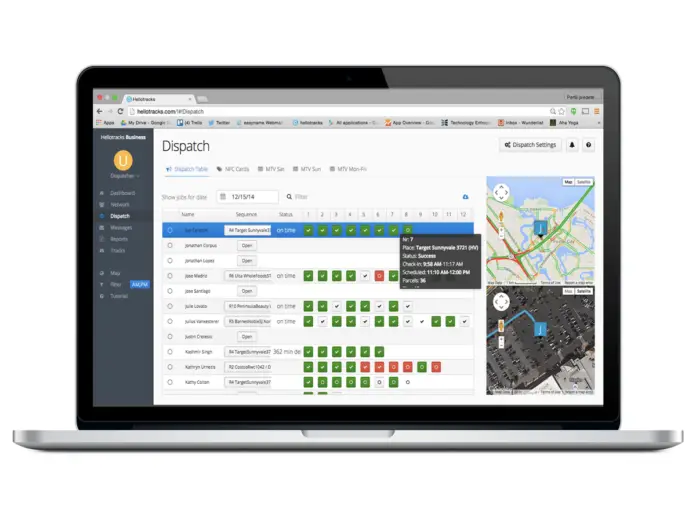The success of any company relies heavily on efficient management and optimization of resources. The key to achieving this lies in effective fleet management. With the advent of technology, businesses now have access to a powerful tool that can streamline their operations and drive their business forward- fleet management software. This software offers a comprehensive solution to monitor, track, and control every aspect of a company’s fleet, resulting in increased productivity, reduced costs, and improved customer satisfaction. In this article, we will delve into the transformative power of fleet management software and how it can propel your business toward success in the competitive market.
How Fleet Management Software Transforms Business Operations
This fleet software has revolutionised how businesses operate by providing a comprehensive solution to monitor and control every aspect of a company’s fleet. By leveraging advanced technology, this software allows enterprises to remotely track and manage their vehicles, drivers, and assets in real-time. This level of visibility enables businesses to optimise routes, allocate resources efficiently, and improve overall operational efficiency.
One of the critical advantages of fleet management software is its ability to increase productivity. Businesses can save valuable time and allocate resources more effectively by automating time-consuming tasks such as route planning, vehicle maintenance scheduling, and driver performance monitoring. This software also provides insights into driver behaviour, allowing businesses to identify areas for improvement and implement strategies to enhance productivity.
Fleet management software helps businesses reduce costs. By monitoring fuel consumption, vehicle maintenance schedules, and driver behaviour, companies can identify inefficiencies and take proactive measures to reduce fuel consumption and maintenance costs. This software also enables businesses to track vehicles in real time, minimising the risk of theft and unauthorised use, which can lead to significant cost savings.
The Role of Fleet Management Software in Reducing Operational Costs
By providing real-time monitoring and tracking of vehicles, this software allows companies to optimise routes, identify inefficient driving behaviours, and minimise fuel consumption. With accurate data on their fleet’s performance, businesses can make informed decisions to improve efficiency, reduce maintenance costs, and save money.
It helps in optimising vehicle maintenance schedules. By automating maintenance reminders and tracking vehicle service history, companies can ensure timely repairs and preventative maintenance, reducing the risk of breakdowns and costly emergency repairs. This proactive approach extends the lifespan of vehicles and lowers maintenance expenses over time.
FMS enables businesses to manage their assets effectively, preventing theft and unauthorised use. With features like GPS tracking and geofencing, companies can monitor their vehicles’ locations and receive immediate alerts in case of any unauthorised activity. This not only prevents financial losses but also increases the overall safety and security of the fleet.
This software is valuable for businesses looking to reduce operational costs. By improving efficiency, optimising routes, and enhancing maintenance schedules, this software helps companies streamline their operations, save money, and ultimately drive their business forward.
Key Features to Look for in Fleet Management Software
When choosing software, several key features should be considered. First and foremost, the software should offer real-time tracking and monitoring capabilities. This allows managers to keep a close eye on their fleet at all times, ensuring that vehicles are used efficiently and drivers adhere to company policies. Real-time tracking also enables managers to respond quickly to any issues or emergencies that may arise.
Another critical feature of fleet management software is advanced reporting and analytics. Good software should be able to generate detailed reports on various aspects of the fleet, such as fuel consumption, driver behaviour, and maintenance schedules. These reports provide valuable insights and help identify areas for improvement, ultimately leading to more informed decision-making and a more efficient fleet operation.
Integration with other systems and devices is also a key feature to look for in fleet management software. The software should seamlessly integrate with other systems and devices, such as GPS, telematics, and fuel cards. This allows for a holistic approach to fleet management, where all data is gathered and analysed in one central platform. Integration also reduces the need for manual data entry and ensures accurate and up-to-date information is always available.
Conclusion
In conclusion, when choosing fleet management software, looking for features such as real-time tracking, advanced reporting and analytics, and integration capabilities is crucial. These features enable businesses to effectively manage their fleet, optimise resources, and drive their business forward. By investing in the right fleet management software, companies can increase productivity, reduce costs, and improve customer satisfaction.
Infographic created by
Track Your Truck, a GPS vehicle tracking devices provider
The content Team Writer is one of the writers from our team of content writers. The Business Goals blog is expanding day by day and we need more writers and brand ambassadors for promoting our media website. If you are interested contact your portfolio through the Write for Us page.




















































